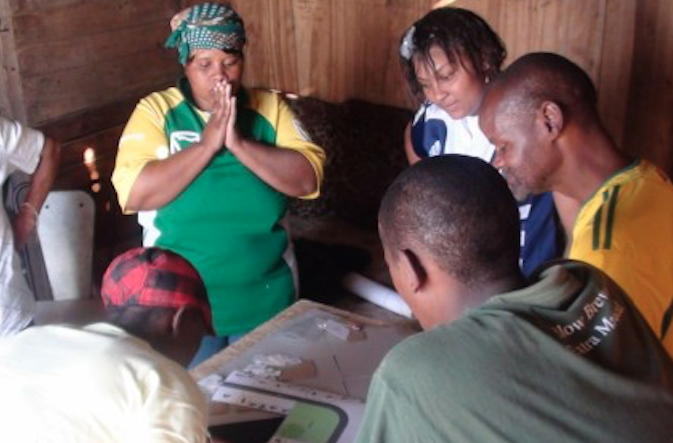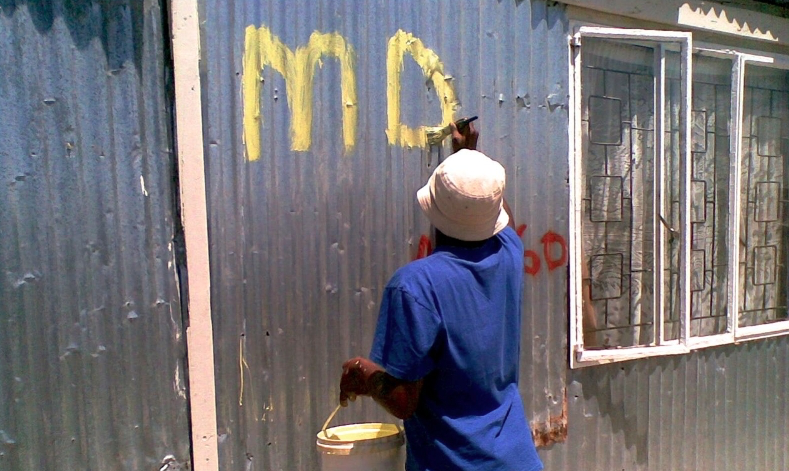By Ava Rose Hoffman (on behalf of CORC)
In this blog, Mzwanele Zulu—National Informal Settlement Network (ISN) Coordinator—discusses the process of identifying community priorities and engaging with local government to construct the Midrand Water, Sanitation and Hygiene (WaSH) Facility, which will become operational in the coming weeks.
They are close to transport and they are not far from the city as well. People do not want to go to the peripheries—they’re always being chased away from the cities. They want to be developed where they are so they are able to access employment opportunities and walk to workplaces and places that they’re looking for jobs. So we’re hoping that working closely with the municipality will create an opportunity for them to remain there.
When we identified the settlement, there was no water, no electricity, no toilet facilities… When we started, I think 7 years ago, engaging with Midrand and with other communities in the Eastern Cape Region—in particular in Nelson Mandela Metro—we started talking about the challenges that communities are facing… We believe in people helping themselves. We started capacitating leaders to engage and talk about their challenges, and of course we did enumerations and profiled the settlement.
The community was very receptive to the idea of saving—they are continuously saving. They are seeing value in what we are doing through this process. They started saving and it took about four to five years to be able to get a buy-in from the municipality. We’ve been engaging with the municipality—trying to convince them to assist us in working together and ensuring that these people will be improving their conditions with the support of the Municipality. So, that’s how this process unfolded in the beginning.
During these early stages of engagement between the community, the ISN and the Municipality, Mzwanele describes that “the Municipality was shocked to hear about Midrand—they didn’t know about it—and they started by putting one tap for the community.” The installation of the water tap, connected to the public municipal system, marked significant progress in alerting the Municipality about Midrand’s needs and getting local government “on board” with the upgrading process. After the installation of the water tap, replacing bucket and pit toilets with proper flush toilets constituted the next item on the community’s upgrading agenda.
As such, the design for the WaSH facility was developed by the community with technical support from iKhayalami building team who project managed the building of the facility by working closely with community members who were employed through the project and who also received training from the iKhayalami team. The first phase was funded by the SHARE project through iKhayalami; the second phase will be funded by the Community Organisation Resource Centre (CORC). The facility consists of ten flush toilets, wash basin facilities for doing laundry, and a caretaker room where an upkeep employee will store amenities such as soap and toilet paper. Mzwanele describes that for the time being, the facility does not include showers: “This is setting a precedent. If in the future, we need to do it, we can consider putting in showers as well.”
We started this process not knowing if either the mayor or senior officials of the Municipality would be happy with the kind of approach that we are doing with the community. But as we speak, we are working towards signing a Memorandum of Understanding [with the Municipality]. It’s not an easy thing—it takes time—and of course, the politicisation of our program is one of the key challenges that we are facing. Some of the people in the Municipality were doubting us, as the Alliance—that we perhaps belonged to a political party. But in the end, everyone understood that we are just helping those that are ready to help ourselves and that we are trying to organise and prepare communities that are ready for upgrading and development.
At the moment, our key objective is to set a precedent with this one project so that they are able to see that we are not just talking. We are having some things on the ground that are happening so they can be able to see the improvement of services being done at the community level. Because if these people are able to use flush toilets, then of course, we’ll be talking about electrification of these settlements and other services that are required for the community. The other challenge that the community is facing—it’s a common problem nationally, of course: housing. They are living in wooden structures, plastic structures, but what else can they do? Whilst they are waiting for housing from government, they are living there. They’ve proposed with us that they would like to re-block their settlement. That means that they need to improve their top structures. Working very closely with the municipality, we will be able to bring more innovation.





